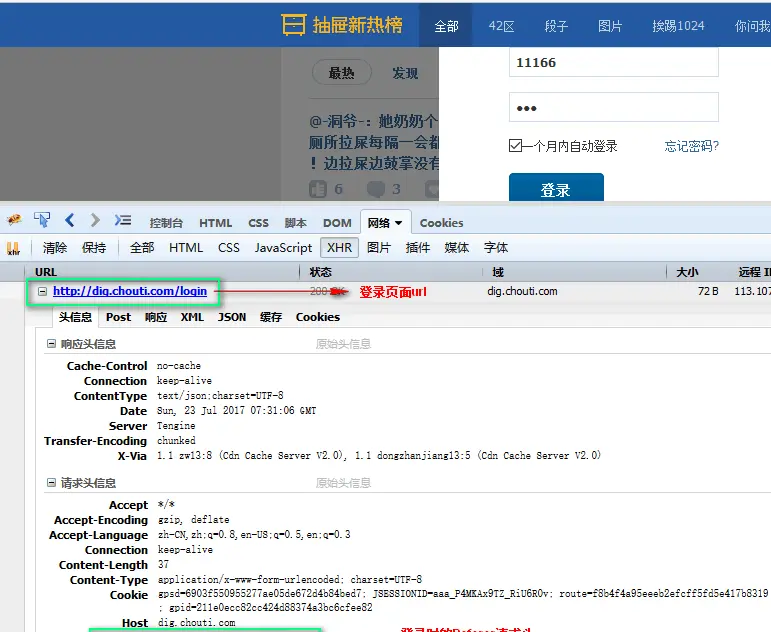【轉載自: https://www.jianshu.com/u/3fe4aab60ac4
】
requests請求,就是用python的requests子產品模拟浏覽器請求,傳回html源碼
模拟浏覽器請求有兩種,一種是不需要使用者登入或者驗證的請求,一種是需要使用者登入或者驗證的請求
一、不需要使用者登入或者驗證的請求
這種比較簡單,直接利用requests子產品發一個請求即可拿到html源碼
#!/usr/bin/env python
# -*- coding:utf8 -*-
import requests #導入模拟浏覽器請求子產品
http =requests.get(url="http://www.iqiyi.com/") #發送http請求
http.encoding = "utf-8" #http請求編碼
neir = http.text #擷取http字元串代碼
print(neir) 得到html源碼
<!DOCTYPE html>
<html>
<head>
<title>抽屜新熱榜-聚合每日熱門、搞笑、有趣資訊</title>
<meta charset="utf-8" />
<meta name="keywords" content="抽屜新熱榜,資訊,段子,圖檔,公衆場合不宜,科技,新聞,節操,搞笑" />
<meta name="description" content="
抽屜新熱榜,彙聚每日搞笑段子、熱門圖檔、有趣新聞。它将微網誌、門戶、社群、bbs、社交網站等海量内容聚合在一起,通過使用者推薦生成最熱榜單。看抽屜新熱榜,每日熱門、有趣資訊盡收眼底。
" />
<meta name="robots" content="index,follow" />
<meta name="GOOGLEBOT" content="index,follow" />
<meta name="Author" content="搞笑" />
<meta http-equiv="X-UA-Compatible" content="IE=EmulateIE8">
<link type="image/x-icon" href="/images/chouti.ico" rel="icon"/>
<link type="image/x-icon" href="/images/chouti.ico" rel="Shortcut Icon"/>
<link type="image/x-icon" href="/images/chouti.ico" rel="bookmark"/>
<link type="application/opensearchdescription+xml"
href="opensearch.xml" title="抽屜新熱榜" rel="search" /> 二、需要使用者登入或者驗證的請求
擷取這種頁面時,我們首先要了解整個登入過程,一般登入過程是,當使用者第一次通路時,會自動在浏覽器生成cookie檔案,當使用者輸入登入資訊後會攜帶着生成的cookie檔案,如果登入資訊正确會給這個cookie
授權,授權後以後通路需要登入的頁面時攜帶授權後cookie即可
1、首先通路一下首頁,然後檢視是否有自動生成cookie
#!/usr/bin/env python
# -*- coding:utf8 -*-
import requests #導入模拟浏覽器請求子產品
### 1、在沒登入之前通路一下首頁,擷取cookie
i1 = requests.get(
url="http://dig.chouti.com/",
headers={'Referer': 'http://dig.chouti.com/'}
)
i1.encoding = "utf-8" #http請求編碼
i1_cookie = i1.cookies.get_dict()
print(i1_cookie) #傳回擷取到的cookie
#傳回:{'JSESSIONID': 'aaaTztKP-KaGLbX-T6R0v', 'gpsd': 'c227f059746c839a28ab136060fe6ebe', 'route': 'f8b4f4a95eeeb2efcff5fd5e417b8319'} 可以看到生成了cookie,說明如果登陸資訊正确,背景會給這裡的cookie授權,以後通路需要登入的頁面攜帶授權後的cookie即可
2、讓程式自動去登入授權cookie
首先我們用浏覽器通路登入頁面,随便亂輸入一下登入密碼和賬号,擷取登入頁面url,和登入所需要的字段

攜帶cookie登入授權
#!/usr/bin/env python
# -*- coding:utf8 -*-
import requests #導入模拟浏覽器請求子產品
### 1、在沒登入之前通路一下首頁,擷取cookie
i1 = requests.get(
url="http://dig.chouti.com/",
headers={'Referer':'http://dig.chouti.com/'}
)
i1.encoding = "utf-8" #http請求編碼
i1_cookie = i1.cookies.get_dict()
print(i1_cookie) #傳回擷取到的cookie
#傳回:{'JSESSIONID': 'aaaTztKP-KaGLbX-T6R0v', 'gpsd': 'c227f059746c839a28ab136060fe6ebe', 'route': 'f8b4f4a95eeeb2efcff5fd5e417b8319'}
### 2、使用者登陸,攜帶上一次的cookie,背景對cookie中的随機字元進行授權
i2 = requests.post(
url="http://dig.chouti.com/login", #登入url
data={ #登入字段
'phone': "8615284816568",
'password': "279819",
'oneMonth': ""
},
headers={'Referer':'http://dig.chouti.com/'},
cookies=i1_cookie #攜帶cookie
)
i2.encoding = "utf-8"
dluxxi = i2.text
print(dluxxi) #檢視登入後伺服器的響應
#傳回:{"result":{"code":"9999", "message":"", "data":{"complateReg":"0","destJid":"cdu_50072007463"}}} 登入成功 3、登入成功後,說明背景已經給cookie授權,這樣我們通路需要登入的頁面時,攜帶這個cookie即可,比如擷取個人中心
#!/usr/bin/env python
# -*- coding:utf8 -*-
import requests #導入模拟浏覽器請求子產品
### 1、在沒登入之前通路一下首頁,擷取cookie
i1 = requests.get(
url="http://dig.chouti.com/",
headers={'Referer':'http://dig.chouti.com/'}
)
i1.encoding = "utf-8" #http請求編碼
i1_cookie = i1.cookies.get_dict()
print(i1_cookie) #傳回擷取到的cookie
#傳回:{'JSESSIONID': 'aaaTztKP-KaGLbX-T6R0v', 'gpsd': 'c227f059746c839a28ab136060fe6ebe', 'route': 'f8b4f4a95eeeb2efcff5fd5e417b8319'}
### 2、使用者登陸,攜帶上一次的cookie,背景對cookie中的随機字元進行授權
i2 = requests.post(
url="http://dig.chouti.com/login", #登入url
data={ #登入字段
'phone': "8615284816568",
'password': "279819",
'oneMonth': ""
},
headers={'Referer':'http://dig.chouti.com/'},
cookies=i1_cookie #攜帶cookie
)
i2.encoding = "utf-8"
dluxxi = i2.text
print(dluxxi) #檢視登入後伺服器的響應
#傳回:{"result":{"code":"9999", "message":"", "data":{"complateReg":"0","destJid":"cdu_50072007463"}}} 登入成功
### 3、通路需要登入才能檢視的頁面,攜帶着授權後的cookie通路
shouquan_cookie = i1_cookie
i3 = requests.get(
url="http://dig.chouti.com/user/link/saved/1",
headers={'Referer':'http://dig.chouti.com/'},
cookies=shouquan_cookie #攜帶着授權後的cookie通路
)
i3.encoding = "utf-8"
print(i3.text) #檢視需要登入才能檢視的頁面 擷取需要登入頁面的html源碼成功
全部代碼
get()方法,發送get請求
encoding屬性,設定請求編碼
cookies.get_dict()擷取cookies
post()發送post請求
text擷取伺服器響應資訊
#!/usr/bin/env python
# -*- coding:utf8 -*-
import requests #導入模拟浏覽器請求子產品
### 1、在沒登入之前通路一下首頁,擷取cookie
i1 = requests.get(
url="http://dig.chouti.com/",
headers={'Referer':'http://dig.chouti.com/'}
)
i1.encoding = "utf-8" #http請求編碼
i1_cookie = i1.cookies.get_dict()
print(i1_cookie) #傳回擷取到的cookie
#傳回:{'JSESSIONID': 'aaaTztKP-KaGLbX-T6R0v', 'gpsd': 'c227f059746c839a28ab136060fe6ebe', 'route': 'f8b4f4a95eeeb2efcff5fd5e417b8319'}
### 2、使用者登陸,攜帶上一次的cookie,背景對cookie中的随機字元進行授權
i2 = requests.post(
url="http://dig.chouti.com/login", #登入url
data={ #登入字段
'phone': "8615284816568",
'password': "279819",
'oneMonth': ""
},
headers={'Referer':'http://dig.chouti.com/'},
cookies=i1_cookie #攜帶cookie
)
i2.encoding = "utf-8"
dluxxi = i2.text
print(dluxxi) #檢視登入後伺服器的響應
#傳回:{"result":{"code":"9999", "message":"", "data":{"complateReg":"0","destJid":"cdu_50072007463"}}} 登入成功
### 3、通路需要登入才能檢視的頁面,攜帶着授權後的cookie通路
shouquan_cookie = i1_cookie
i3 = requests.get(
url="http://dig.chouti.com/user/link/saved/1",
headers={'Referer':'http://dig.chouti.com/'},
cookies=shouquan_cookie #攜帶着授權後的cookie通路
)
i3.encoding = "utf-8"
print(i3.text) #檢視需要登入才能檢視的頁面 注意:如果登入需要驗證碼,那就需要做圖像處理,根據驗證碼圖檔,識别出驗證碼,将驗證碼寫入登入字段